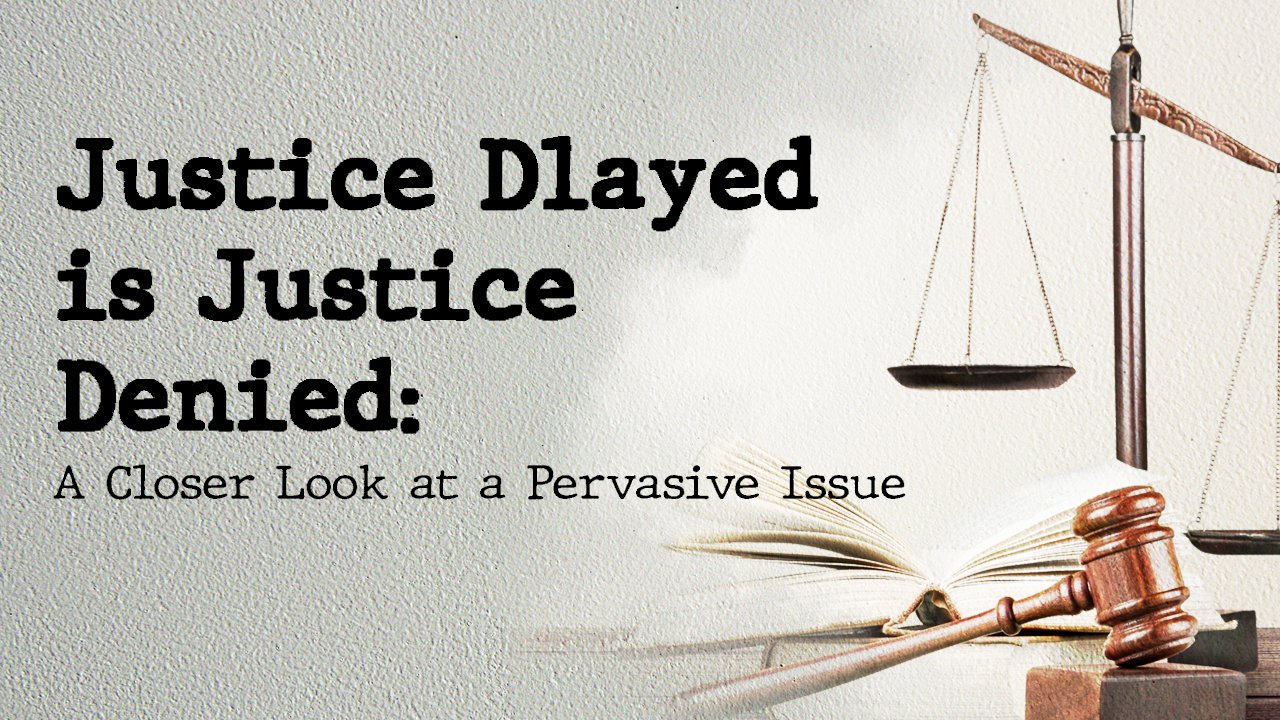
"Justice delayed is justice denied"—a phrase that resonates deeply within the legal community and society at large. This expression highlights a critical concern in the administration of justice: when the legal process is protracted, it often leads to a form of injustice itself. Timely justice is a cornerstone of any civilized society. When justice is delayed, it not only undermines public trust in the legal system but also prolongs the suffering of victims and those seeking redress. In this blog, we will explore the implications of delayed justice, its causes, and potential solutions.
The Impact of Delayed Justice
1. Erosion of Public Trust:
When legal proceedings drag on for years, the public's faith in the judicial system diminishes. People begin to perceive the justice system as inefficient, biased, or even corrupt. This erosion of trust can lead to a lack of respect for laws and legal institutions, destabilizing the social fabric.
2. Prolonged Suffering for Victims:
For victims of crime or injustice, delayed justice means prolonged agony. The mental and emotional toll can be devastating, as victims and their families are forced to relive traumatic experiences repeatedly. Delays can lead to a sense of helplessness and frustration, compounding the original trauma.
3. Encouragement of Impunity:
Perpetrators may take advantage of the slow judicial process, feeling emboldened by the lack of immediate consequences for their actions. This not only puts more people at risk but also perpetuates a cycle of crime and injustice, as offenders believe they can escape accountability.
4. Denial of Rights:
For the accused, prolonged trials can mean extended periods of incarceration without conviction, violating their right to a speedy trial. In cases where the accused are innocent, this delay can destroy lives and reputations, often irreparably.
Causes of Delayed Justice
1. Overburdened Courts:
One of the primary reasons for delayed justice is the overwhelming backlog of cases in courts. With limited resources and a shortage of judges, courts struggle to keep up with the influx of new cases, leading to significant delays.
2. Procedural Complexities: Legal processes often involve intricate procedures that, while designed to ensure fairness, can also contribute to delays. Continuous adjournments, frequent appeals, and loopholes exploited by legal professionals can stretch out cases for years.
3. Lack of Infrastructure:
Many judicial systems, especially in developing countries, suffer from inadequate infrastructure. This includes a shortage of courtrooms, outdated technology, and insufficient support staff, all of which contribute to slower case processing.
4. Corruption and Bureaucracy :
In some cases, corruption within the legal system or excessive bureaucracy can deliberately stall proceedings. Bribery, favoritism, or political influence can lead to delays that serve the interests of certain parties, rather than justice.
Potential Solutions
1. Judicial Reforms:
Comprehensive reforms are needed to streamline legal procedures, reduce red tape, and eliminate unnecessary delays. Simplifying legal processes can make them more efficient and less time-consuming.
2. Increased Investment:
Governments must invest in the judicial infrastructure, hiring more judges and support staff, and providing better training and resources. The use of technology, such as digitized case management systems, can also expedite proceedings.
3. Alternative Dispute Resolution (ADR):
Encouraging the use of ADR methods, such as mediation and arbitration, can reduce the burden on courts by resolving disputes outside the traditional legal framework. ADR can be quicker, less formal, and less costly.
4. Public Awareness and Advocacy.
Educating the public about their rights and the importance of timely justice can lead to increased demand for reforms. Advocacy groups can play a crucial role in highlighting cases of delayed justice and pushing for systemic change.
Conclusion
Justice delayed is, indeed, justice denied. The timely delivery of justice is not just a legal necessity but a moral imperative that upholds the principles of fairness and equality. While the challenges are many, they are not insurmountable. Through judicial reforms, investment in infrastructure, and increased public awareness, we can work towards a system where justice is not only delivered but delivered on time. It is a shared responsibility—of governments, legal professionals, and society at large—to ensure that the scales of justice are balanced and that every individual receives the justice they deserve, without unnecessary delay.
